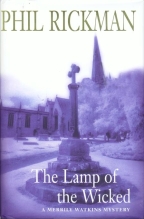The Lamp of the Wicked
Phil Rickman
Macmillan/Pan Macmillan
UK Hardcover First
ISBN 0-333-90805-8
Publication Date: 04-04-2003
552Pages; £10.00
Date Reviewed: 03-30-03
Reviewed by Rick Kleffel © 2003

REFERENCES
COLUMNS
|
|
|
The Lamp of the WickedPhil RickmanMacmillan/Pan MacmillanUK Hardcover FirstISBN 0-333-90805-8Publication Date: 04-04-2003552Pages; £10.00Date Reviewed: 03-30-03Reviewed by Rick Kleffel © 2003 |
|
|
REFERENCES |
COLUMNS |
Integrating facts into fiction is nothing new. But it can be more than a little risky to introduce headline news into your richly created fictional milieu. Too much reality can disrupt the fantasy and too little reality can result in an artificial, "bolted-on" feel. With the Merrily Watkins novels, Phil Rickman is in the process of creating literature we've not yet seen, the spiritual procedurals. He's set the novels in the richly atmospheric Herefordshire District, and peopled them with characters his readers have come to know. Merrily Watkins is a Diocesan Deliverance expert -- read "exorcist" -- who as a matter of course comes into contact with a variety of unsavory characters, some simply garden variety criminals, and some of a rather more numinous nature. Through four novels, 'The Wine of Angels', 'Midwinter of the Spirit', 'A Crown of Lights', and 'The Cure of Souls', Rickman has written books that are neither supernatural nor strictly mystery. His latest 'The Lamp of the Wicked', calls itself 'A Merrily Watkins Mystery'. Don't let this deceive you into thinking that it's very much different than the others. Rickman still unfurls his stories with a luminous prose that brings his characters to life. 'The Lamp of the Wicked' is Rickman's best novel yet, with all the complexity that characterizes his other works, and a clarity that permeates the web of factual crime and fictional characters he deftly draws together.
Rickman does a lot very right in 'The Lamp of the Wicked'. As an entry in a series, first and foremost, he's definitely found a way to keep the characters growing and changing while keeping the core values that make the characters likable. As the novel begins, Gomer Parry, Merrily's gardener, finds that he has unexpected competition in the "plant hire" business. When this competition turns out to be more ruthless than anyone ever suspected possible, the police, and eventually Merrily become involved. A local man is implicated in one and potentially more murders. A simple sewage excavation escalates into a search for bodies throughout the county.
Rickman does a superb job in this novel of creating a very complex web of fact and fiction which eventually envelops the reader. His writing and transitions are so skilled that readers will feel effortlessly drawn into the setting, the unfolding mystery and the character changes without any thread-change fatigue. He keeps everybody gruff and single-minded enough so that they don't feel like pawns but participants in the unraveling nightmare. And yes, there are bits of nightmare scudding through Rickman's fictional landscape, drawn not from the supernatural but from the all-too-real.
The Merrily Watkins novels have a growing cast, but Rickman expertly divides up the action, so that no characters have mere walk-ons and no characters feel over-exposed. He does a particularly good job at showing the maturation of Merrily's now seventeen year-old daughter Jane. No, she's not grown up, but she's getting there by bits and pieces. Her steps forward and back seem very well-judged and ring true. Merrily herself remains suspicious of all the aspects of her job, both spiritual and criminal. This keeps her from being a simple crime-solver or ghost buster.
Rickman is at the top of his powers as he weaves the horrible truth into his fictional setting. By dribs and drabs, the connections to a horrific real-life crime slither into his surroundings. He's judicious in the way he integrates reality into artifice. There's never a jarring moment. He manages to use a sort of "six degrees of separation" effect to infuse his narrative with tension, terror and authority. It certainly keeps the reader glued to the book.
Then there's the ever-changing soap opera effect of his returning characters. Rickman's talent is such that everybody who pops up brings with them a welcome breath of familiarity. The over-arching plots of the Merrily's relationship to Lol, Jane's growing pains, and Merrily's shifting sense of her place on earth as a Diocesan Deliverance Expert turn up to integrate smoothly into the plot. There's a lot that happens in this story as well as the criminal mystery, but the two follow step after step with nary a misstep.
Readers who have enjoyed the Merrily Watkins books will find that this is certainly the best yet. Rickman achieves a new level of integrated complexity and clarity. Readers who have never encountered Merrily Watkins might find this a fine place to start, but they should be warned that they'll be buying the rest of the series before they finish this entry. Readers of mainstream mysteries from P. D. James, Martha Grimes and the Appalachian mysteries of Sharyn McCrumb will find that Rickman offers a similar enjoyment in a very different environment. My advice is to go back and start with 'The Wine of Angels'. 'The Lamp of the Wicked' is a book worthy of much anticipation. It lives up to every bit any reader can muster.